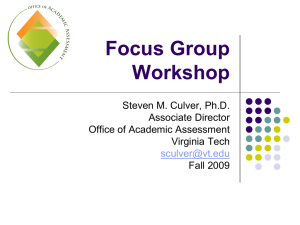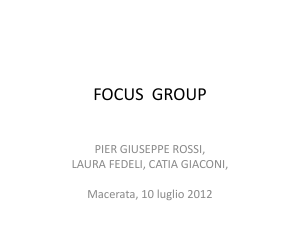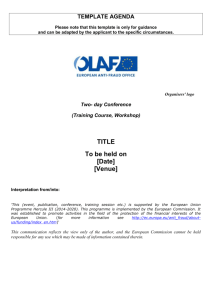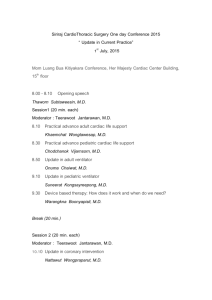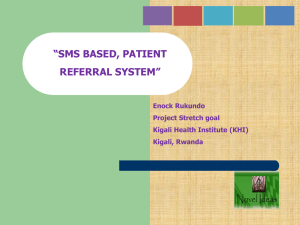Town Hall Meeting on Molecular Genetics
advertisement
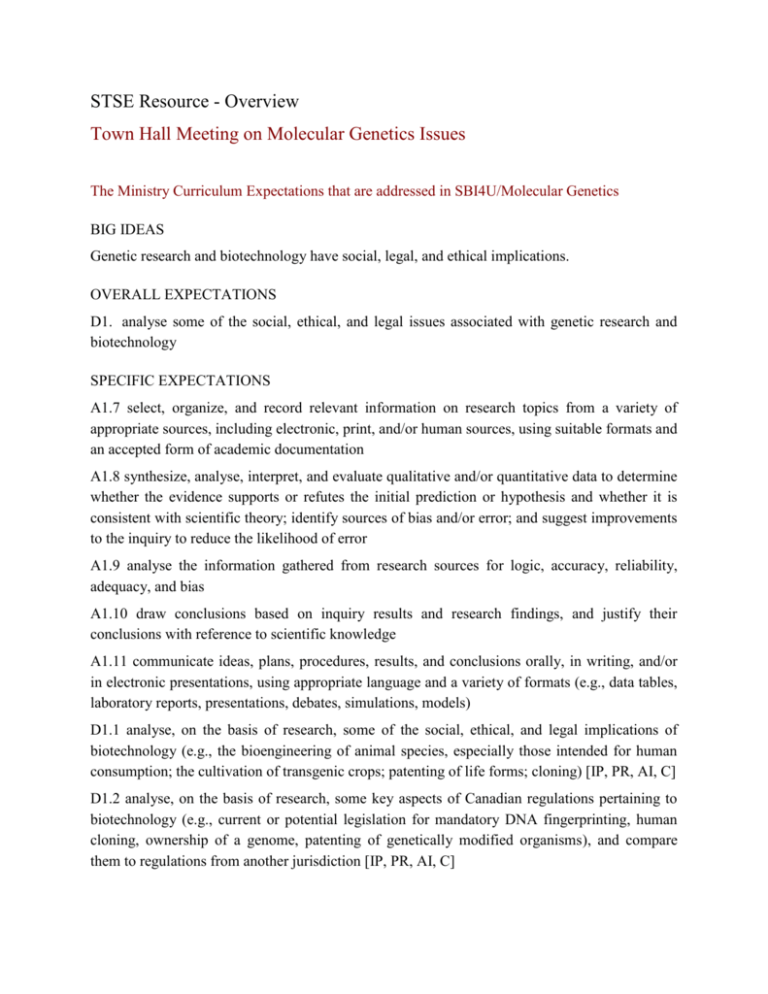
STSE Resource - Overview Town Hall Meeting on Molecular Genetics Issues The Ministry Curriculum Expectations that are addressed in SBI4U/Molecular Genetics BIG IDEAS Genetic research and biotechnology have social, legal, and ethical implications. OVERALL EXPECTATIONS D1. analyse some of the social, ethical, and legal issues associated with genetic research and biotechnology SPECIFIC EXPECTATIONS A1.7 select, organize, and record relevant information on research topics from a variety of appropriate sources, including electronic, print, and/or human sources, using suitable formats and an accepted form of academic documentation A1.8 synthesize, analyse, interpret, and evaluate qualitative and/or quantitative data to determine whether the evidence supports or refutes the initial prediction or hypothesis and whether it is consistent with scientific theory; identify sources of bias and/or error; and suggest improvements to the inquiry to reduce the likelihood of error A1.9 analyse the information gathered from research sources for logic, accuracy, reliability, adequacy, and bias A1.10 draw conclusions based on inquiry results and research findings, and justify their conclusions with reference to scientific knowledge A1.11 communicate ideas, plans, procedures, results, and conclusions orally, in writing, and/or in electronic presentations, using appropriate language and a variety of formats (e.g., data tables, laboratory reports, presentations, debates, simulations, models) D1.1 analyse, on the basis of research, some of the social, ethical, and legal implications of biotechnology (e.g., the bioengineering of animal species, especially those intended for human consumption; the cultivation of transgenic crops; patenting of life forms; cloning) [IP, PR, AI, C] D1.2 analyse, on the basis of research, some key aspects of Canadian regulations pertaining to biotechnology (e.g., current or potential legislation for mandatory DNA fingerprinting, human cloning, ownership of a genome, patenting of genetically modified organisms), and compare them to regulations from another jurisdiction [IP, PR, AI, C] STSE Resource - Teacher Notes Town Hall Meeting on Molecular Genetics Issues [STSE Resource] Molecular Genetics is topic that has strong STSE implications as it has such a big impact on people’s lives. A way to make students aware of STSE topics related to the Molecular Genetics Unit would be to have open debates on these issues. A Town Hall Meeting format would be ideal for this discussion. Timing The first 10 min of class the teacher will explain the Town Hall Meeting Activity and dividing the students into different groups. The teacher should take care in creating diverse groups of students and of similar abilities (a supply would have to create random groups). The Town Hall will then take up the remaining 65 min (divided in 3 topics of 20 min each (60 min total) and 5 min transition time). Roles: The Moderator - A student volunteer Fundamental to the town hall meeting is a moderator who facilitates the discussion. This person should feel at ease speaking in front of the group, but he or she is not the teacher. The moderator’s goal is to make the participants feel comfortable in expressing themselves openly, while keeping the discussion on track. The People PRO - 1/3 of the class These are the people who agree that the “topic” overall is a good idea and want it to be implemented or say implemented. They believe that the benefits outweigh the negatives. The People CON - 1/3 of the class These are the people who do not agree that the “topic” is a good idea and want it to be either banned or not to take effect. They believe that the negatives are too substantial to risk the impact that it would have on people/society or the environment. Panel of directors (observers) - 1/3 of the class The remainder of the class listens to the discussion between the pro and con groups and make notes of the points made. In the end they individually vote on which group they think won the argument. Format of the Town Hall Meeting • The moderator will be equipped with three topics to be discussed. [Listed below] • He/she will read one topic, which consists of an issue and its accompanying questions, and allow the pro and con groups to discuss it amongst themselves for 5 min while also making notes on what to say. • The moderator will then direct the discussion on this topic for 15 min making sure to allow only one person to talk at a time without interruptions and alternating between the two groups. • Each person can only voice their opinion on the topic once to allow for every student to speak. • In the end, the panel of directors will vote for which side they agree with and a winning group will be established. • All the students on the panel of directors with also submit the notes they made during the discussion. These are only intended to have students pay attention during this activity and will be checked for completion. • This concludes one round of discussion and the groups, still with the same students in them, will change roles (Pros become Cons, Cons become Observers, and the Observers become Pros). • The moderator will also be changed with another student and the original moderator will take their role in that group. • The new moderator raises a new topic and the 20 min cycle begins again. Setting the Rules Prior to starting the discussion, the moderator should lay down a few ground rules. Generally, rules should include the following: • • • • Only one person talking at a time. No members should be put down because of their opinions; All thoughts and ideas are valued; and There are no wrong or right answers. Source: http://www.ncspfsig.org/Project_Docs/Town%20Hall%20Meeting%20Protocol.pdf Debate Topics Topic 1 Issue: Corporations that have patented genetically modified (GM) seeds legally require farmers to buy new seeds from them each planting season. Corporations that find GM crops on a farm that did not purchase their seed can take the farmer to court. However, natural processes such as cross-pollination can result in the migration of GM crops to neighboring farms. Questions: Should private companies be able to patent life forms, including genetic material? Why or why not? Topic 2 Issue: Modern biotechnologies can provide modified food products that may not always be healthy and sometimes are banned by the regulatory agencies in certain countries. The product safety is often hard to ascertain however and these agencies may be slow to respond, for example bovine growth hormone is approved for use in dairy cattle in the United States but not in Canada. Questions: Can regulatory agencies always be trusted to be up to date with the latest research and allow or ban these products accordingly? Should food product that have been created through biotechnology be labeled somehow to allow people to make their own healthy decisions or not consume these product at all if they chose to do so? Topic 3 Issue: Insurance companies base the price of health insurance on many factors, one of which is the current health of the individual insured. People are required to disclose any know health issues when applying for health insurance. Nowadays, one of the best predictors of future health is genetic testing as it can predict the susceptibility to certain diseases. Questions: Who owns and controls our personal genetic information? Who should have access to our personal genetic information and decide how it will be used? Should insurance companies be allowed to screen people’s DNA to provide a more relevant quote? Potential Limitations A possible limitations of this format could be that not every student might get a chance to speak in the discussions due to the short timeframe of each debate session. Another limitation is that if there are any classroom management issues that could distract from the topic raised and also take away form the discussion time. The format of the activity is also quite elaborate and the teacher has to make sure that they explain everything clearly from the start for this operation to flow smoothly. This activity is also quite geared to the students who are linguistic learners and might not engage the other students. Possible modifications for special student needs The modifications would have to be made specific to the needs of the student by consulting their IEP. For example a student with severe anxiety that is not comfortable with talking in front of the class might be always places in the group of observers, where he/she can just make notes on the points made in the debate and still be engaged in that way. The role of the moderator is also quite an interesting one as they are always an active participant in the discussion even though they do not voice an opinion. The teacher can assign these roles to students who are usually very active and always want to have a say in class. If this format of a debate does not work for some students at all, the teacher can assign them individual work where they could potentially even work on these issues on a computer and be able to research and follow this debate in the literature and media.
